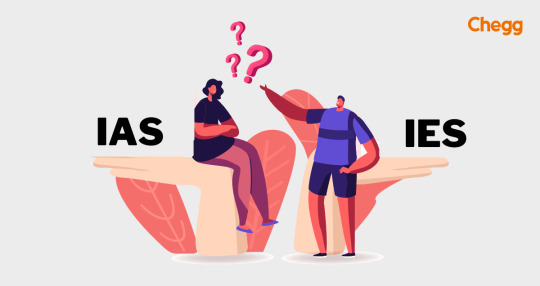Don't wanna be here? Send us removal request.
Text
Difference between IAS and IES | Guide to UPSC
IAS (Indian Administrative Service) and IES (Indian Engineering Services) are distinct branches within the Union Government. These designations are overseen by the Union Public Service Commission (UPSC).
The fundamental distinction lies in their roles and responsibilities. IAS officers primarily operate within the administrative and managerial framework of the Indian Government. In contrast, IES officials are tasked with managing the executive and technical aspects of government operations.
This article will delve into an in-depth comparison between these two cadres, offering a comprehensive understanding of the distinctions between IAS and IES. Before delving into the nuances of their differences, it's important to first comprehensively explore IAS and IES individually.

IAS and IES: IAS stands for Indian Administrative Service, while IES represents Indian Engineering Services. Both are integral parts of the Union Government and are managed by the Union Public Service Commission (UPSC).
Roles and Responsibilities: IAS officers are primarily engaged in administrative and managerial tasks, involving policy formulation, implementation, and public service delivery. IES officials, on the other hand, handle the technical and executive aspects of government projects, focusing on engineering and technical solutions.
Functions: IAS officers work across diverse sectors, such as civil administration, police, revenue, and development. They are responsible for ensuring smooth governance, law enforcement, and public welfare. IES officials specialize in engineering disciplines and are responsible for designing, executing, and supervising technical projects related to infrastructure, public works, and technological advancements.
Training: IAS officers undergo training at premier institutions like the Lal Bahadur Shastri National Academy of Administration (LBSNAA). IES officers receive training at specialized academies, enhancing their technical skills and knowledge.
Promotions: IAS officers follow a structured hierarchy, with opportunities for promotions to higher administrative positions. IES officers can rise through the ranks in their specialized technical fields.
Eligibility: Both cadres require candidates to clear the UPSC examination. However, the educational backgrounds and disciplines differ. IAS candidates come from various academic backgrounds, while IES candidates should have engineering degrees.
Job Diversity: IAS officers enjoy a diverse range of postings, from district administration to policy-making in government ministries. IES officers often work on projects related to engineering, technology, and infrastructure development.
Impact: IAS officers have a direct influence on governance, policy formulation, and public service delivery. IES officers contribute to the technical and infrastructural advancement of the nation.
Challenges: IAS officers often handle complex administrative and social issues, requiring effective leadership and decision-making skills. IES officers must ensure the successful execution of projects, balancing technical aspects with budgetary and logistical constraints.
0 notes
Text
Best Career Options in India for Freshers and Experienced Candidates
Selecting the right career path can feel akin to scaling a steep mountain. In today's era, where choices abound, sifting through the myriad of career options poses a significant challenge. With technology's rapid advancement, coupled with flourishing industrial and educational sectors, the demand for diverse skills seems boundless, offering a multitude of avenues to explore.
Fields such as teaching, medicine, mechanics, interior designing, web development, entrepreneurship, hospitality, and journalism stand out as strong career choices.
If you find yourself grappling with the decision of which path to pursue, this article serves as a guiding light. We'll delve into strategies for pinpointing the ideal career opportunities in India that align with your distinct skill set. By embarking on these avenues in 2023, you can lay the foundation for a more prosperous future, characterized by enhanced financial security and overall well-being. Continue reading to gain deeper insights.

Here is a list of top career options in 2023 to help you get started:
1.Software Engineer
2.Certified Nurses
3.Therapist (Occupational Therapy Assistant)
4.Speech-language Pathologists
5.Digital Marketing Professional
6.Data Analyst
7.Financial Managers
8.Chartered Accountants
9.Doctors & Surgeons
10.Data Scientist
11.Machine Learning Experts
12.Blockchain Developer
13.Full Stack Software Developer
14.Product Management
15.Management Consultant
16.Investment Banker
17.Marketing Manager
18.Teaching
0 notes
Text
Best Career Opportunities & Courses after BAMS
The term "Ayurveda" is derived from "ayur" (life) and "veda" (knowledge). Ayurvedic medicines are renowned for effectively treating even chronic ailments with minimal side effects. This has led to a surge in popularity for Ayurvedic methods and surgery.
The demand for Ayurvedic therapies is on the rise, prompting many students to pursue related courses. One prominent option is the Bachelor of Ayurvedic Medicine and Surgery (BAMS) degree.
In the past, BAMS graduates had limited career paths. However, this has changed significantly. Today, students have a wide array of choices for careers and post-BAMS courses.
The BAMS program offers promising career prospects. Students gain insights into Ayurvedic principles and their application in diverse medical treatments. The scope and salary potential after BAMS are enticing, with numerous rewarding career opportunities available.

List of Top 8 Courses After BAMS
We have listed the top 8 diplomas and post-graduate level courses after pursuing a BAMS degree. Students who desire to get a more profound knowledge of the medical system can take these courses after BAMS.
1.Post Graduate Diploma in Drug Regulatory Affairs
2.Diploma in Medical Trichology
3.Diploma in Food and Nutrition
4.MBA in Hospital Healthcare Management
5.of Public Health (MPH)
6.M.Sc. Nutrition
7.MD/MS Ayurveda
8.M.Sc. Health Sciences
0 notes
Text
What to Do After Retirement in India to Earn Money?
After retiring in India, individuals have diverse options. Spending time with family, pursuing hobbies, and volunteering offer personal fulfillment. Part-time work or consulting keeps retirees engaged and financially independent. Teaching or mentoring allows them to share expertise. Entrepreneurship can spark creativity. Physical activities and travel contribute to well-being. Lifelong learning through courses or workshops remains accessible. Joining social groups and clubs fosters new connections. In essence, retirement presents opportunities for personal growth, engagement, and exploration.

Best 15 Options: What to Do After Retirement in India
No matter whatever industry you worked in before your retirement, this list consists of some of the great jobs that anyone with the right skills and knowledge can do in their life after retirement:
1.Typing Jobs
2.Translator
3.Consultancy
4.Freelancing
5.Tutor
6.Subject Expert
7.Blogger/ Content Writer
8.Babysitting
9.Telephonic Jobs
10.Bookkeeping
11.Virtual Assistant
12.Online Store
13.Real Estate Investor
14.Resume Writer
15.Business/ Start-up
0 notes
Text
Career Path and Scope of CFA in India
"What is the scope of a Chartered Financial Analyst (CFA) in India?" must have crossed your mind if you are a finance and accounting graduate. The application of CFA in India will be discussed in this article.
You will receive the highest honor in the field of investment management if you are a Chartered Financial Analyst. In India, there are more than 20,000 CFA character holders. The Chartered Financial Analyst Institute offers the CFA program. It is a post-graduate degree that is highly respected throughout the world for work in the financial sector.
Financial planning, financial analysis, portfolio management, economics, statistics, and probability theory are just a few of the many areas and subjects it covers that are relevant to accounting and finance.

Top 10 Career Options after CFA in India
The CFA certification exposes you to a wide range of career options. There is a broad scope of CFA in India. Plenty of job opportunities are there that boost your knowledge and skills and help you grow more in your career.
Investment Banker
Portfolio Manager
Risk Manager
Market Research Analyst
Private Bankers
Business Analyst
Equity Analyst
Finance Manager
Chartered Financial Analyst
Q&A Expert
0 notes
Text
MBA after Engineering for Success in 2023 - Benefits, Scope, Salary, Colleges
BTech is the starting point for a career in engineering. After a BTech degree, a successful job is possible. In their engineering careers, students can land fantastic jobs as electronic and communication engineers, robotics engineers, nanotechnology engineers, software engineers, and more. The average annual pay for a B.Tech student ranges from 0.2 to 4.5 lakhs depending on their knowledge and talents. However, a research found that 48% of BTech engineering students do not have jobs. To support their BTech careers, students opt for alternative courses.

"What about MBA after engineering?" is one of the queries posed most commonly by BTech students. You must be asking why an engineer would want to pursue an MBA. What advantages do MBAs have after engineering? Is the MBA simple for engineers?
1. Diversification of Skills: MBA complements technical engineering skills with management, leadership, and business knowledge.
2. Career Transition: Helps engineers shift from technical roles to managerial or business-oriented positions.
3.Entrepreneurship: Equips engineers to start and manage their own ventures with business acumen.
4. Leadership Opportunities: Prepares for leadership roles requiring both technical expertise and management skills.
5. Networking: Offers extensive networking opportunities for career growth and collaborations.
6. Industry Exposure: Provides real-world business scenarios, internships, and projects for a broader perspective.
7. Holistic Skill Set: MBA combines technical proficiency with problem-solving, communication, and strategic abilities.
Remember that the decision to pursue an MBA after engineering should align with your career goals and aspirations. Weighing the benefits against the challenges can help you make an informed choice.
0 notes
Text
Top 15 Short-term Courses after MBA to Boost Your Career
Education never ends. After graduating or after receiving your degree, you might keep enrolling in other courses to further your professional exploration. With the expansion of the private sector, there is a growing demand for business graduates. Students' interest in short-term courses that can be taken after completing an MBA is growing. You can have a successful career with an MBA from a reputable financial institution, but you can achieve even greater heights by continuing your education after your MBA. After an MBA, continuing your education greatly improves your knowledge and skills. By obtaining cutting-edge skills and knowledge, it allows students to delve further into the working world. Following an MBA, obtaining such qualifications broadens your employment options and significantly raises your compensation.

Top 15 Short-Term Courses after MBA
We have listed the best short-term courses a student can pursue after completing an MBA. You can enrich your career after MBA by gaining more knowledge and developing new skills through these short-term courses.
1.Certificate Program in Business Analytics (CBA)
2.Chartered Financial Analyst (CFA)
3.Certified in Production and Inventory Management (CPIM)
4.Financial Risk Management (FRM)
5.Certified Information Systems Auditor (CISA)
6.Project Management Certification (PMP)
7.Certification in Risk Management Assurance (CIRM)
8.SAP Certification Program
9.Stock Market Certification
10.Personality Development
11.Digital Marketing Certification
12.Social Media Marketing Certification
13.Certificate in Entrepreneurship
14.Human Resources Certification
15.Executive MBA
0 notes
Text
Top 10 Courses After MBA Finance that Pay Well
One of the most popular concentrations for this postgraduate degree is the MBA in Finance. The knowledge and abilities of managerial decision-making, analytical thinking, coordinating processes, and estimating profits and losses of a firm or industry are introduced to the students here. Students are introduced to a variety of financial alternatives through this program. This enables a prospective employee to start their career in finance with both theoretical and practical experience. However, obtaining a solid job does not require nothing more than an MBA degree. You need to have some specialized knowledge and additional talents. So the simplest method to increase employability after earning an MBA in finance is to enroll in short-term courses.

You've provided a clear overview of the benefits and considerations regarding pursuing an MBA in Finance and enhancing employability through short-term courses. Here's a breakdown of the key points:
1. MBA in Finance: An MBA with a concentration in Finance equips students with essential skills like managerial decision-making, analytical thinking, process coordination, and financial analysis for evaluating profits and losses in businesses and industries.
2. Diverse Financial Knowledge: The program introduces students to a wide range of financial concepts, enabling them to explore various financial avenues and opportunities.
3. Theoretical and Practical Experience: Students gain both theoretical knowledge and practical experience, setting them up for a career in finance with a solid foundation.
4. Career Entry: While an MBA in Finance is valuable, it's important to understand that simply having the degree may not be enough to secure a job; specialized knowledge and additional skills are often required.
5. Increasing Employability: To enhance job prospects and employability, enrolling in short-term courses is a recommended strategy.
6. Short-Term Courses: These courses provide specific and targeted skills that complement the broader knowledge gained from an MBA program.
7. Focused Expertise: Short-term courses allow you to specialize in areas like financial modeling, data analysis, risk management, investment strategies, or industry-specific finance.
8. Staying Current: The financial industry is dynamic, and short-term courses help you stay updated with the latest trends, technologies, and practices.
9. Customized Learning: Short-term courses can be chosen based on your career goals and areas of interest, tailoring your skill set to match industry demands.
10. Career Advancement: The additional knowledge and skills gained from short-term courses can provide you with a competitive edge in the job market and accelerate your career growth.
0 notes
Text
Explaining 3 Year Gap After BTech: What it Means and How to Navigate It
A career obstacle shouldn't be caused by a career gap on your resume. These days, it's rather normal for students to experience a 3-year job gap after receiving their BTech. After graduation, students typically take a few years off to focus on getting ready for government admission tests or continuing their education. There are a number of good ways to explain your career gaps, even though they might not make a positive first impression on your recruiting manager. This post is all about discussing a three-year professional hiatus after receiving a BTech. Potential employers typically look askance at or view a longer-than-3-year professional gap as a red flag. Employers nowadays are, however, also become more understanding and welcoming.

1. Honesty and Transparency: Be truthful about your career gap and provide a clear explanation without embellishing or hiding the facts.
2. Relevant Skills: Highlight any skills you acquired or improved during the gap, such as self-discipline, project management, or technical skills.
3. Explaining the Reason: If you took a gap for exam preparation, further studies, or personal reasons, briefly mention it in your resume or cover letter.
4. Online Learning: Showcase any online courses, certifications, or workshops you completed during the gap to demonstrate continuous learning.
5. Freelance or Volunteer Work: Mention any freelance projects, volunteer work, or internships you engaged in during the gap to showcase your commitment.
6. Networking Activities: If you attended workshops, seminars, or industry events during the gap, highlight how they contributed to your professional growth.
7. Self-Improvement: Emphasize how the gap allowed you to work on personal development, such as improving communication skills or expanding cultural awareness.
8. Positive Spin: Frame the gap as a deliberate choice that allowed you to gain a broader perspective and enhance your readiness for the job.
9. References: If possible, provide references from mentors, professors, or professionals who can vouch for your growth during the gap.
10. Confidence: Approach interviews with confidence and focus on the skills and experiences that make you a strong fit for the role, regardless of the gap.
0 notes
Text
List of Top 12 Internship Websites in India.
Obtaining that vital graduate job offer no longer solely depends on having a strong degree in today's society. These days, a successful career depends just as much on your educational background and test results as it does on your relevant work experience. As a result, internships have become a vital tool for people trying to differentiate themselves from the competition. An internship is a formal program that businesses offer to help educate and provide new graduates and students with useful employment experience.

You've provided a comprehensive overview of the importance of internships in today's job market. Internships indeed play a pivotal role in bridging the gap between education and practical work experience. Here are a few additional points to consider:
1. Practical Experience: Internships provide hands-on experience to apply classroom learning in real-world settings.
2. Skill Development: They help develop valuable skills, both technical and interpersonal, enhancing your employability.
3. Networking: Internships offer opportunities to build connections with professionals in your chosen field.
4. Resume Boost: Relevant internships make your resume stand out and demonstrate your commitment.
5. Career Exploration: Internships let you explore different career paths before committing to a full-time job.
6. Industry Insights: Gain a deeper understanding of industry practices, trends, and challenges.
7. Job Opportunities: Successful internships can lead to full-time job offers from the same company.
0 notes
Text
Top Subject for Sending Resume to Get Hired Faster
Your prospective employer is very likely to come from that 47% of people, which means that you will only be hired if you carefully choose the subject line for your resume.
Writing a strong topic line, however, can be challenging, especially since there are numerous approaches that can be taken depending on the situation. So how will an applicant know what to write about for whatever job posting?

You can find all the information you need here, including the reasons why subject lines are crucial, how to write them, and—most importantly—the absolute finest professional email subject line examples for each situation.
1. Application for [Job Title] - Experienced [Your Name]
2. Experienced [Your Profession] Seeking [Job Title] Opportunity
3. [Your Name] - Application for [Job Title] Position
4. [Your Name]: [Job Title] Candidate with [Years] Experience
5. Experienced [Your Profession]: Applying for [Job Title] Opening
6. [Your Name] | [Job Title] Application | [Years] of Experience
7. Application from [Your Name] for [Job Title] Role
8. Experienced [Your Profession] Interested in [Job Title] Position
9. [Your Name] | [Job Title] Application | [Years] Experience in [Industry]
10. [Your Name] Applying for [Job Title] | [Years] of [Industry] Experience
0 notes
Text
Managerial Economics - Meaning, Nature, Importance and Scope
Every day, business owners must make critical judgments. These choices may concern a business opportunity, a new product, a potential rival, or the course of the company. Businesses must rely on specialists for such crucial judgments. These professionals have a managerial economics background. They are the professionals who put a monetary value on the many chances and then encourage the business to move forward.

1. Application of Economics: Applies economic principles to real-world business scenarios.
2. Decision-Making: Guides rational and informed managerial decisions.
3. Resource Allocation: Efficiently allocates limited resources to achieve goals.
4. Cost Analysis: Analyzes costs (explicit and implicit) for optimal strategies.
5. Market Dynamics: Considers demand, supply, elasticity, and market structures.
6. Risk Assessment: Evaluates risks and uncertainties in decision processes.
7. Time Horizon: Addresses short-term operations and long-term strategies.
8. Ethical Considerations: Integrates ethical principles into decision-making.
9. Interdisciplinary Approach: Draws from economics, math, and statistics.
10. Practical Application: Offers actionable insights for business improvement.
0 notes
Text
Top 10 In-Demand Courses After BTech CSE (Computer Science Engineering)
With India's booming IT industry, computer science is a popular choice. After BTech CSE, diverse courses are available, like MTech, MS, MBA, and Ph.D. These offer varied roles: MTech—Software Engineer, MS—Research and Data Science, MBA—Project Manager, Ph.D.—Academics and Research. Research well to align your career with your strengths. This article explores the top 10 trending courses after BTech CSE for informed decisions.

Being a BTech CSE student, you will study a variety of subjects. Some of the subjects are:
1.Applied Physics, Chemistry, and Maths
2.Digital Circuits
3.Communication technology
4.Coding
5.Engineering Mechanics
6.Computer Architecture
7.Database Management System
8.Engineering Mechanics
9.Signal Processing
10.Artificial Intelligence
11.Software Engineering
12.Data Structures
After completing their degree in Computer Science, many students opt for higher studies to polish and improve their skill set. If you are wondering, what you can do after CSE this article might be helpful to clarify your doubts about the best courses after BTech CSE.
0 notes
Text
HR Interview Questions for Freshers (2023 Detailed Guide with Answers)
You're on the brink of success after months of CV submissions. The HR interview focuses on your personality and past experiences for future roles. Interviews last around 45 minutes to an hour, featuring key questions to understand your aspirations. Common queries vary by job type, but certain questions are standard. They gauge how you handle situations and how past experiences shape future actions. Here's a guide to common HR questions and my answers to help you excel.

1. Tell me about yourself.
- Keep it concise and relevant to your professional background.
- Highlight key experiences, skills, and achievements that align with the job role.
2. What interests you about this role/our company?
- Research the company and mention specific aspects that appeal to you.
- Connect your skills and career goals to how they align with the company's values and objectives.
3. Can you walk me through your resume?
- Briefly describe your educational background, relevant work experiences, and any extracurricular activities.
- Emphasize achievements and skills gained in each role.
4. What is your greatest strength?
- Choose a strength that is relevant to the job and provide an example of how you've demonstrated it.
- Highlight how this strength can contribute to the team or company.
5. What is your greatest weakness?
- Mention a genuine weakness, but also explain how you're working to overcome it.
- Focus on showing self-awareness and a commitment to personal growth.
6. Describe a challenging situation you've faced at work and how you handled it.
- Choose a situation that demonstrates problem-solving, teamwork, and your ability to handle pressure.
- Explain the steps you took to resolve the situation and the positive outcome.
7. How do you handle working in a team?
- Provide an example of a successful collaboration or project you've been a part of.
- Highlight your communication skills, adaptability, and willingness to contribute.
8. Where do you see yourself in 5 years?
- Discuss your career aspirations and how they align with potential growth within the company.
- Emphasize your commitment to continuous learning and professional development.
9. Why did you leave your previous job (or why do you want to leave your current job)?
- Be honest, but focus on the desire for new challenges or opportunities for growth.
- Avoid speaking negatively about your previous employer.
10. Do you have any questions for us?
- Prepare thoughtful questions about the company culture, team dynamics, or the specific role.
- This demonstrates your genuine interest in the position and company.
0 notes
Text
Exploring Your Options: Choosing the Right Career Path for BBA Graduates
After the 12th grade, BBA is a popular undergraduate degree choice for those studying commerce. It can be mentioned that being a BBA graduate is highly chosen by students given that India has more than 500 BBA colleges. But what happens after earning a BBA degree? What careers one can pursue or ought to pick after completing a BBA? Although there are countless possibilities, only one must be chosen. Additionally, it's great if you make a wise choice. The finest employment for BBA graduates in every industry are discussed in this post, and if you wish to continue your education, you will also learn about some excellent courses you may take after your BBA. Read the article through to the finish.

BBA (Bachelor of Business Administration) graduates have a wide range of job opportunities available to them across various industries and sectors. The skills and knowledge gained during a BBA program make graduates well-suited for roles that involve business administration, management, communication, problem-solving, and analytical skills. Here are some potential job opportunities for BBA graduates:
1.Skill Emphasis: Highlight and leverage key skills developed during your BBA program, including communication, problem-solving, teamwork, data analysis, and critical thinking. Emphasizing these skills in your job search and applications can make you a valuable asset to potential employers.
2.Industry Specialization: Identify industries that align with your interests and strengths. Consider internships, part-time jobs, or volunteer work in your chosen industry to gain relevant experience and insights.
3.Networking: Build a strong professional network by attending industry events, job fairs, and networking sessions. Connecting with professionals in your desired field can provide valuable insights, job leads, and potential referrals.
4.Resume and Cover Letter Tailoring: Customize your resume and cover letter for each job application. Highlight experiences, skills, and achievements that are directly relevant to the specific role you're applying for.
5.Internships and Entry-Level Roles: Don't shy away from internships or entry-level positions, as they can serve as stepping stones to more advanced roles. These opportunities provide valuable experience and a chance to prove your capabilities.
6.Continuous Learning: Stay updated with industry trends, technological advancements, and emerging practices. Pursue additional certifications or online courses to enhance your skills and make yourself more competitive in the job market.
7.Interview Preparation: Practice common interview questions, develop concise and compelling responses, and research the company thoroughly before interviews. Showcase your passion for the industry and your potential contribution to the organization.
0 notes
Text
A Comprehensive Guide to Applying for a PhD in India
Did you know that India is one of the top 5 countries producing the most PhDs, with over 20,000 graduates annually?
Great, isn't it?
And with the development of new technologies and scientific research, the number of PhD holders in India will continue to expand in the years to come. If you are considering obtaining a PhD, continue reading to learn everything there is to know about earning a PhD in India.

It is common knowledge that a PhD serves to instruct students on how to carry out research in a certain area. Candidates develop skills like critical thinking, problem-solving, and communication as well as the ability to produce academic papers and present findings. However, there are motivations for choosing a PhD program that are relevant to careers. These reasons include:
Getting monthly allowances from the government to fund research.
A PhD student is seen as an expert in their field, thus, making them eligible for job openings related to teaching and research.
A chance to go to other countries for Academic Exchange Programs and learn various things.
Getting complete control over what you want to study and how you wish to continue with your research.
A PhD student gets to interact and work with the best academicians in their field and the professional experts who will guide them during their research.
0 notes
Text
Top Careers After Electrical Engineering: Exploring Exciting Career Paths
Did you know that by 2025, the market for Indian electrical equipment would have grown by 12% CAGR and will be worth over $70 billion? Sounds fantastic, right? Particularly if you are a student of electrical engineering and are considering your best options for professions following electrical engineering. Additionally, electrical engineering is a well-known subfield of engineering. And the list of electrical occupations is always growing as a result of the enormous need for electronic equipment, processors, designs, etc.
You must, however, select the vocation that best suits you from among the many job options in India's electrical engineering industry, so you must be informed. The finest career options following electrical engineering are listed here.

14 Careers After Electrical Engineering: Scope & Avg. Salary 2023
Power Engineer
Control Systems Engineer
Research and Development Engineer
Electronics Engineer
Robotics Engineer
Renewable Energy Engineer
Micro Electrical Engineer
Electrical Engineering
Instrumentation Engineer
Telecommunications Engineer
Electrical Design Engineer
Acoustic Engineer
Aerospace Engineer
CAD Engineer
0 notes